Social Sciences > QUESTIONS & ANSWERS > Quiz > Singapore University of Social Sciences SCO 201Attempt2_ PCOQ01_ SCO201_JAN21_L02_ SPACE, PLA (All)
Quiz > Singapore University of Social Sciences SCO 201Attempt2_ PCOQ01_ SCO201_JAN21_L02_ SPACE, PLACE, PEOPLE AND THE CITY. Quiz Score: 97.68 out of 99.9 .
Document Content and Description Below
25/02/2021 PCOQ01: SCO201_JAN21_L02: SPACE, PLACE, PEOPLE AND THE CITY PCOQ01 Due Mar 19 at 11:59am Points 99.9 Questions 45 Available Feb 22 at 12am - Mar 19 at 11:59am 25 days Time Limit None ... Allowed Attempts 3 Instructions Attempt History Attempt | Time | Score KEPT | Attempt 2 | 12 minutes | 97.68 out of 99.9 LATEST | Attempt 2 | 12 minutes | 97.68 out of 99.9 Attempt 1 | 25 minutes | 97.68 out of 99.9Score for this attempt: 97.68 out of 99.9 Submitted Feb 25 at 4:06pm This attempt took 12 minutes. You are given 3 attempts for this Pre-Course Quiz (PCOQ). Only the highest score among the 3 attempts will be kept. You will need to pass this quiz by scoring at least 60 out of 100 before you can commence the course. Take the Quiz Again Question 1 These are included in the list of green urbanism features, except: Centralised water systems Sustainable transport Place-based social relations Renewable energy 25/02/2021 PCOQ01: SCO201_JAN21_L02: SPACE, PLACE, PEOPLE AND THE CITY Question 2 The town council is distributing a survey to residents to choose the colour scheme for the buildings in the estate. Which level does this survey occupy in Sherry Arnstein’s Ladder of Citizen Participation (1969)? Consultation Citizen control Partnership Manipulation Question 3 According to Kim and Bui (2019), cities of Southeast Asia are in need of higher resilience towards disasters and the following are needed as resilience-building efforts in Southeast Asia, except: Strengthening economic capital and exclusivity of NGOs and community-based disaster risk reduction Improvements in data and warning systems Innovative programs for resilience-building at the local level Efforts to enhance physical design and planning for hazards Question 4 25/02/2021 PCOQ01: SCO201_JAN21_L02: SPACE, PLACE, PEOPLE AND THE CITY The purpose of commodity production is to: Increase employment Improve the general standard of living Add value to raw materials Generate profit Question 5 Creative cities aim to do all of the following except: Increase inclusion in the knowledge economyFacilitate the exchange of ideas Support innovation Attract talent and investment Question 6 Resilient cities are cities with communities and systems that are able to persevere – to survive and still able to thrive – through social and environmental challenges. Which of the following is a weakness of resilient cities paradigm in its implementation?Western-centric, as most of the approaches for urban resilience comes from the West. 25/02/2021 PCOQ01: SCO201_JAN21_L02: SPACE, PLACE, PEOPLE AND THE CITY Lack of attention to political ecology in its over-emphasis on engineering solutions Lack of personal initiatives and responsibilities, as well as innovations, among citizens. Multi-stakeholder partnerships make the process long and difficult Question 7 In ‘The Metropolis and Mental Life’ (1903), German sociologist Georg Simmel observed that emotional relationships intensified alongside intellectual ones in cities. FalseTrue Question 8 Manabu Fujimura argues in his article, ‘Economic Integration in the Greater Mekong Subregion and Cross-Border Transport Infrastructure’ that: Improvements in cross-border road infrastructure can increase regional integration 25/02/2021 PCOQ01: SCO201_JAN21_L02: SPACE, PLACE, PEOPLE AND THE CITY Geographical disadvantages that increase the cost of transport will prevent economic growth akin to the East Asian model (i.e., South Korea and Japan) The internet and technology can help landlocked countries overcome geographical disadvantages Common trade interests and nodal connections ensure that the region coordinates policy and prevents regional conflicts Question 9 The aim of smart cities is to anticipate all issues of social discontent before they become protest issues. FalseTrue Question 10 Which of the following sentence illustrates the dualistic structure of cities (formal-informal dualistic approach) in Southeast Asia?Rural migration has increased the squeeze of urban job markets and young adults in urban areas face rapid competitions. 25/02/2021 PCOQ01: SCO201_JAN21_L02: SPACE, PLACE, PEOPLE AND THE CITY Housing market has been expanded and the inflation is predicted to impact on purchasing power in Southeast Asia. Financial institutions and shopping centres can be observed while street peddles and prostitutes can also be seen on streets in a typical Southeast Asian city. Building mega malls is seen to stimulate internal spending and old and small business are losing their profit margins. Question 11 The appified world is represented by all of the following except: An open medium for experimentation and creativityA platform for consumption and marketing All of the above Data-driven efficiency and predictability Question 12 When used to define urban areas, density refers to the number of people concentrated in a limited space. True False 25/02/2021 PCOQ01: SCO201_JAN21_L02: SPACE, PLACE, PEOPLE AND THE CITY Question 13 According to Charles Landry and Franco Bianchini in ‘The Creative City’ (1995), creativity and innovation yield the same potential outcomes. FalseTrue Question 14 Spatial justice addresses all of the following issues except: DesirabilityAffordability Sustainability Accessibility Question 15 What are the consequences of sprawling mega-urban regions? Decline of agricultural sector in the outer zones of cities to make way for industrial functions 25/02/2021 PCOQ01: SCO201_JAN21_L02: SPACE, PLACE, PEOPLE AND THE CITY Increasing economic productivity of land as economies urbanise and restructure All of the above Better coordination across localities and administrative authorities, both domestic and international Question 16 In comparison with cities in developed countries, cities in developing countries have gone through rapid economic, sociodemographic and cultural transformations since the end of the Second World War. Which of the characteristics below does not describe such differences? Rising awareness of minorities’ rightsGrowing numbers of housing projects Increasing numbers of mega city-regions Massive labour migration from rural to urban areas Question 17 0 / 2.22 pts The role of ecosystem services paradigm in environmental governance is as follows.Prioritisation of rational decision-making, rather than spiritual beliefs, in valuing natural ecosystems 25/02/2021 PCOQ01: SCO201_JAN21_L02: SPACE, PLACE, PEOPLE AND THE CITY Promoting rural environments as supporting ecosystems for cities ou Answered ou Answered Both a) and b) are correct orrect Answer orrect Answer Economic valuation of natural ecosystems to discourage damages Question 18 Watch the documentary, Samin vs. Semen (English Subtitled, 39:24 minutes) by Watchdoc, 2017. Available at https://www.youtube.com/watch?v=CYbXvOGYRuU (https://www.youtube.com/watch?v=CYbXvOGYRuU) (https://www.youtube.com/watch?v=CYbXvOGYRuU) These concepts are applicable to the case in the documentary film for the reasons cited, except:Urban political ecology: The unequal landscape of social and political powers in making decisions is represented by decisions that are made by the government and a powerful company. Liveable city: The liveability of a city that would benefit from the cement will be at the cost of liveability in these mountains. Accumulation by dispossession: While cities accumulate wealth through their development of buildings, farmers are dispossessed of their lands and livelihoods to support that accumulation. 25/02/2021 PCOQ01: SCO201_JAN21_L02: SPACE, PLACE, PEOPLE AND THE CITY https://canvas.suss.edu.sg/courses/32894/quizzes/49193 10/24 Environmental justice: The over-extraction of groundwater in the mountain area because of the company would lead to the degradation of farming economy. Question 19 The purpose of Vineeta Sinha’s article, ‘Methodological Musings: Trawling Singapore’s Urban Religious Landscapes’ is to: Provide evidence of resilience in the urban contextPoint out the government’s failure to support folk religious practices Highlight the contrast between different forms of religious practice Reveal the hidden practices of minority groups Question 20 Why do we need to know the basics of methods to study cities? Choose the response that is relatively close to the idea emphasised in SCO201. To investigate urban issues systematicallyTo enrich our lived experiences in the neighbourhoods To predict the next emerging urban business ideas To invest in the future infrastructure Question 21 25/02/2021 PCOQ01: SCO201_JAN21_L02: SPACE, PLACE, PEOPLE AND THE CITY These are examples of environmental justice issues in Southeast Asia, except: The persistence of traditional settlements in the midst of rapid urban development Racial segregation that has consequences on unequal distribution of environmental hazards and disaster risks The urban poor often have to settle in areas with poor environmental conditions The risk of flooding is higher in areas of marginalised population as they are less protected from the floods Question 22 The Asian Coalition for Community Action (ACCA) is a programme under the Asian Coalition for Housing Rights (ACHR) for citywide and community-driven housing upgrading in Asia. The programme does so through the following activity. All of the above Developing joint financial mechanisms to fund the upgrading Supporting the role of the poor in proactive political process in the city Secure land tenure for urban poor families 25/02/2021 PCOQ01: SCO201_JAN21_L02: SPACE, PLACE, PEOPLE AND THE CITY Question 23 Big data is regularly used for all of the following except: Keeping citizens informed Improving transport links Geo-hacking Managing energy and water supply Question 24 Koh Sin Yee (2019) pointed out the aims of comparative urbanism. Which of the following sentence is closer to the aims discussed in her work? Take a political stance in contributing towards understandings of urban processes.Use a data-driven approach to study urban development in Southeast Asia. Understand that sustainability is imperative in comparative urbanism. Accumulate historical archives for future generations. Question 25 25/02/2021 PCOQ01: SCO201_JAN21_L02: SPACE, PLACE, PEOPLE AND THE CITY https://canvas.suss.edu.sg/courses/32894/quizzes/49193 13/24 Urban locations have relative advantages and disadvantages. Which of the following options can promote spatial justice: Moving industry outside of city centres Centralizing education Limiting the movement of goods and resources Localizing food and energy production Question 26 Which of the following is the best description of Lai Ah Eng’s approach in her article ‘A Neighborhood in Singapore: Ordinary People’s Lives “Downstairs”’: A close-up examination of HDB life and its contributions to national culture A general study of HDB culture in Singapore and the necessity of public housing A top-down report on the usage of public facilities and footfall in neighborhood shops and hawker stalls An anecdotal exploration of social groups and their dynamics Question 27 25/02/2021 PCOQ01: SCO201_JAN21_L02: SPACE, PLACE, PEOPLE AND THE CITY Why is it important to challenge “business-as-usual” urbanisation? There is an urgent need to hear the concerns of marginalised communities. All of the above. Marginalised communities have potentials to produce innovative solutions. Business-as-usual can be counterproductive towards innovative solutions for urban problems. Question 28 If you are about to conduct a research project on your neighbourhood based on quantitative approaches, which of the following will be least likely to happen during the data collection? You take notes on seniors' conversations when they play chess at the void deck. You count how many neighbourhood stores accept e-payment. You design 30 questions about residents' well-being in a neighbourhood survey. You check Data.gov.sg to collect the information of residential stability in recent 10 years. 25/02/2021 PCOQ01: SCO201_JAN21_L02: SPACE, PLACE, PEOPLE AND THE CITY Question 29 According to Lily Kong in her article, ‘Cultural Icons and Urban Development in Asia: Economic Imperative, National Identity, and Global Status’, why is cultural capital important? It creates a buzz with high-profile lifestyle and attractions It provides residents with access to global culture It allows the city to withdraw from global competition to focus on unique elements of local culture It provides incentives for artists and writers to contribute to national culture Question 30 All of the following items contribute to uneven development between cities and rural areas except: Governmental policy favouring rural areasRural migration into cities Urban dependency on rural agriculture The dominant position of primate cities Question 31 25/02/2021 PCOQ01: SCO201_JAN21_L02: SPACE, PLACE, PEOPLE AND THE CITY In global cities, the following items can be seen in movement and exchange: Ideas People Goods All of the above Question 32 Which one is an image that represents desakota (McGee, 1991)? 25/02/2021 PCOQ01: SCO201_JAN21_L02: SPACE, PLACE, PEOPLE AND THE CITY 25/02/2021 PCOQ01: SCO201_JAN21_L02: SPACE, PLACE, PEOPLE AND THE CITY https://canvas.suss.edu.sg/courses/32894/quizzes/49193 18/24 Question 33 Why is understanding human agency important in urban development? Human agency is the capacity of individuals to act independently based on his/her free choices, and is therefore an important ingredient in participatory processes.a) and c) are correct. Human agency is the structural forces in society that determines whether urban development would be successful. Human agency is the shaper of a better and sustainable future through the individuals’ ability to behave according to the expectations set by the social structure. Question 34 25/02/2021 PCOQ01: SCO201_JAN21_L02: SPACE, PLACE, PEOPLE AND THE CITY All of the following items are safe from cyberattacks except: Confidential data Municipal energy grids National security documents None of the above Question 35 In ‘The Culture of Cities’, Lewis Mumford’s vision of the city is best described by which of the following statements: The highest manifestation of modern culture and community spirit A site for religious elites A semi-pastoral setting for separate communities to meet and share ideas A network of well-designed highways and expressways that connect communities Question 36 Which of these constitute the urban political ecology perspective? 25/02/2021 PCOQ01: SCO201_JAN21_L02: SPACE, PLACE, PEOPLE AND THE CITY Social and political inequalities that are turned around through social change that is caused by a disaster event. Social and political inequalities that result in inequities of risk distribution among various groups. Social and political inequalities that are made obsolete by disaster situations that affect everyone in the city. All of the above. Question 37 According to the article by Jonathan Rigg, Tuan Anh Nguyen, and Thi Thu Huong Long, ‘The Texture of Livelihoods: Migration and Making a Living in Hanoi’, which of the following factors affected the ability of individuals and their families to improve their standard of living: All of the aboveSocial networks Disease or other hardship Chance Question 38 Which of the following best describes ordinary individual’s concerns regarding technological advancement in cities: 25/02/2021 PCOQ01: SCO201_JAN21_L02: SPACE, PLACE, PEOPLE AND THE CITY Unequal access to information, breach of privacy, misuse of platforms Sale of big data, growth of big government, spread of fake news Creation of tech elite, strengthening of social control, focus on global ambitions Tech illiteracy, high cost of technology, network overload Question 39 In ‘Urbanism as a Way of Life’ (1938), American sociologist Louis Wirth argued in favour of regulations in order to counteract the forces of ‘competition, aggrandizement, and mutual exploitation’ that he said characterized urban social relations. True False Question 40 With regards to sustainable development, Manuel Castells (2002) wrote: “Under which conditions are economic growth, our consumptive patterns, and our ways of living reproducible over time without damaging the conditions of their reproduction?” Through this statement, Castells:Criticises Henri Lefebvre’s position on the destruction of nature by urban space production 25/02/2021 PCOQ01: SCO201_JAN21_L02: SPACE, PLACE, PEOPLE AND THE CITY Agrees with the Brundtland Report on the importance of sustainable development Criticises the preservation of capitalist economy in urban development Agrees with the ecosystem services approach to revise our ways of thinking about economic growth Question 41 What is the main unresolved issue for both smart cities and creative cities: How to address inclusivity How to generate big data How to manage government expectations How to commodify apps Question 42 Urbanisation has been observed in this region. Check the 2019 report `The Future of Asian & Pacific Cities' from the United Nations. What is the estimated percentage of the population living in Asian and Pacific cities?Approximately 70% Approximately 90% 25/02/2021 PCOQ01: SCO201_JAN21_L02: SPACE, PLACE, PEOPLE AND THE CITY Approximately 40% Approximately 50% Question 43 Which of the following economic and business activities does not fit the definition of informal economy in cities? Supermarkets stop selling alcohol after 10:30 pm. Individuals sell self-grown vegetables online. Some people sell unauthorised lotteries at hawker centres. We can set up a hair salon at void desk to serve residents in a housing estate. Question 44 Why is peri-urbanisation in Southeast Asia a challenge in urban governance? Urban development in peri-urban areas may not have sufficient infrastructure and servicesPeri-urban areas are potential new ghettoes of the urban underclass, as new migrants are settling in these areas a) and b) are correct 25/02/2021 PCOQ01: SCO201_JAN21_L02: SPACE, PLACE, PEOPLE AND THE CITY Peri-urban areas are mixed districts that are prone to social unrest Question 45 Which of the sentence is relatively closer to the definition of civil society? Actors of urban development use public sphere to community with state actors.Global warming has resulted in political disputes and conflicts of ideologies. Top-down planning is made to build multifunctional housing estates. The upcoming Initial public offering (IPO) will generate international investment to boost the economy. [Show More]
Last updated: 1 year ago
Preview 1 out of 24 pages

Reviews( 0 )
Document information
Connected school, study & course
About the document
Uploaded On
Oct 16, 2021
Number of pages
24
Written in
Additional information
This document has been written for:
Uploaded
Oct 16, 2021
Downloads
1
Views
282


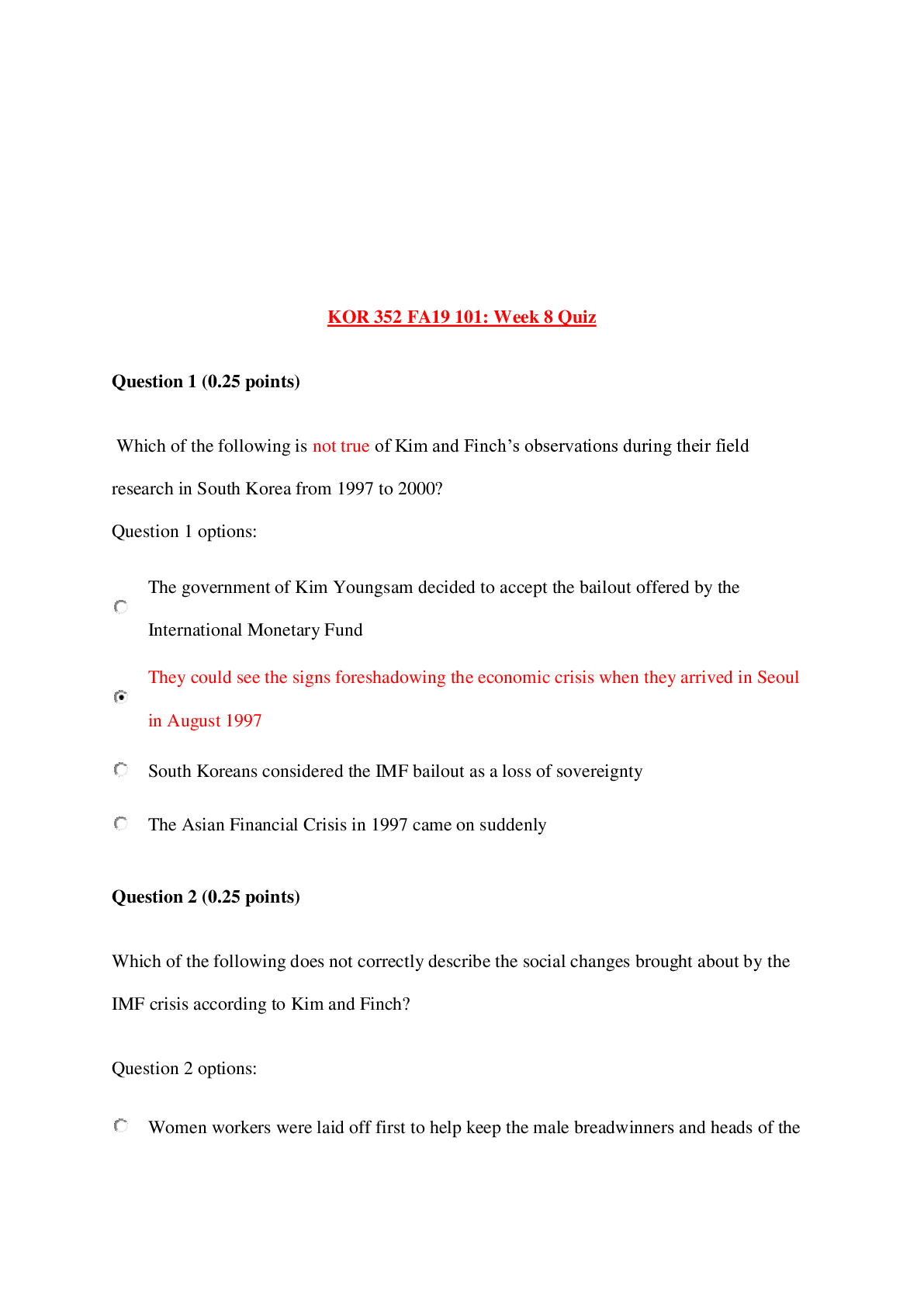
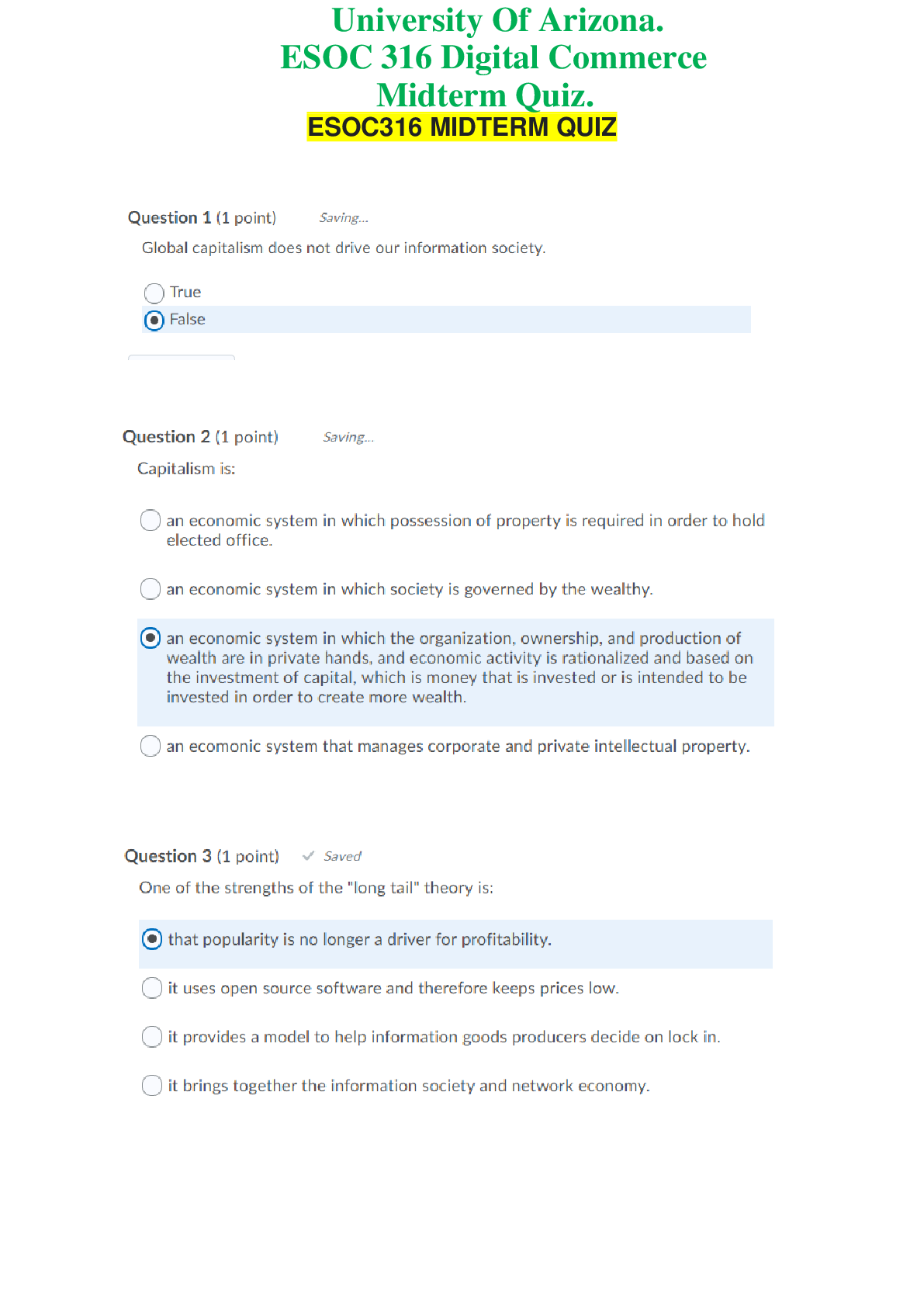
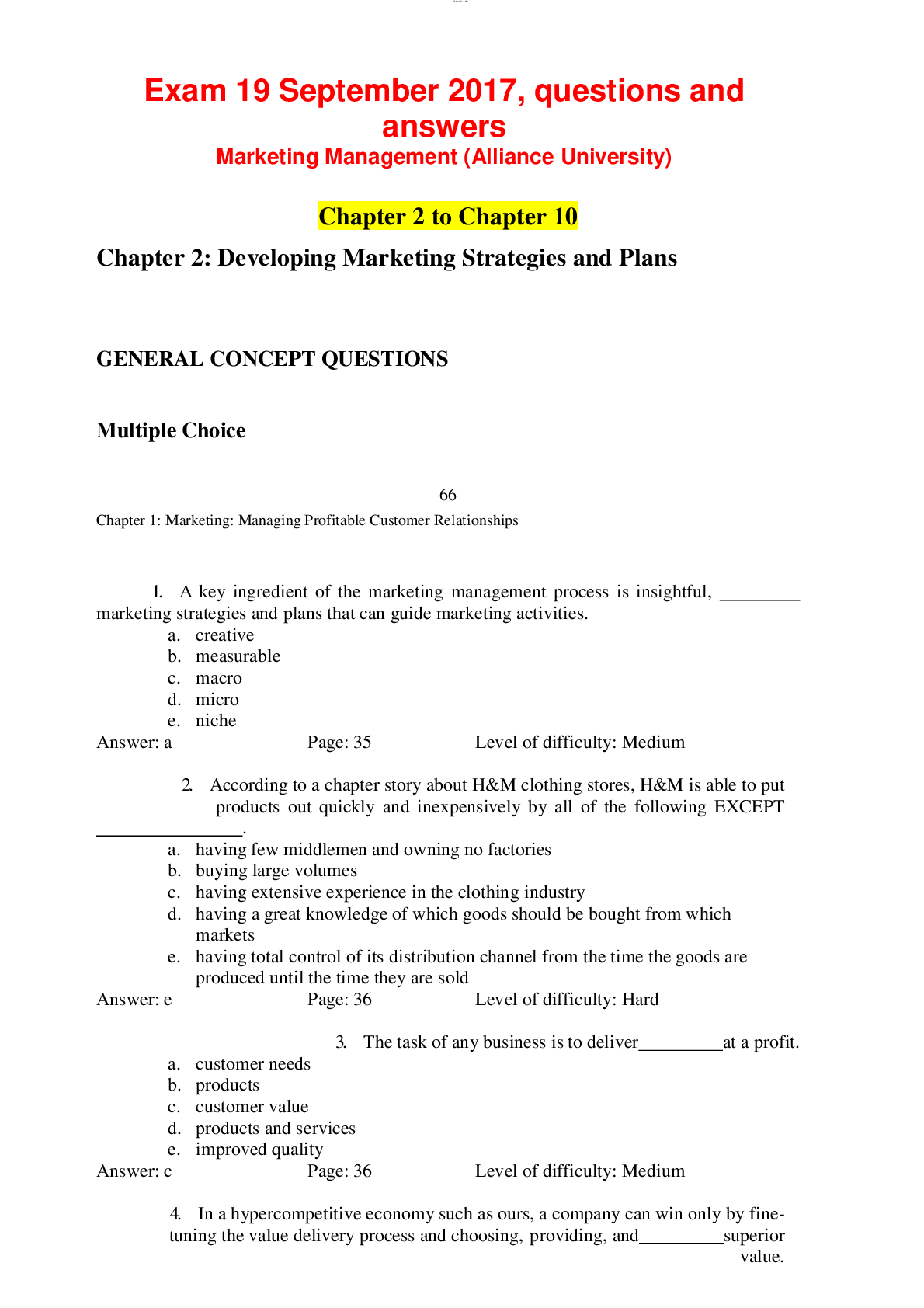
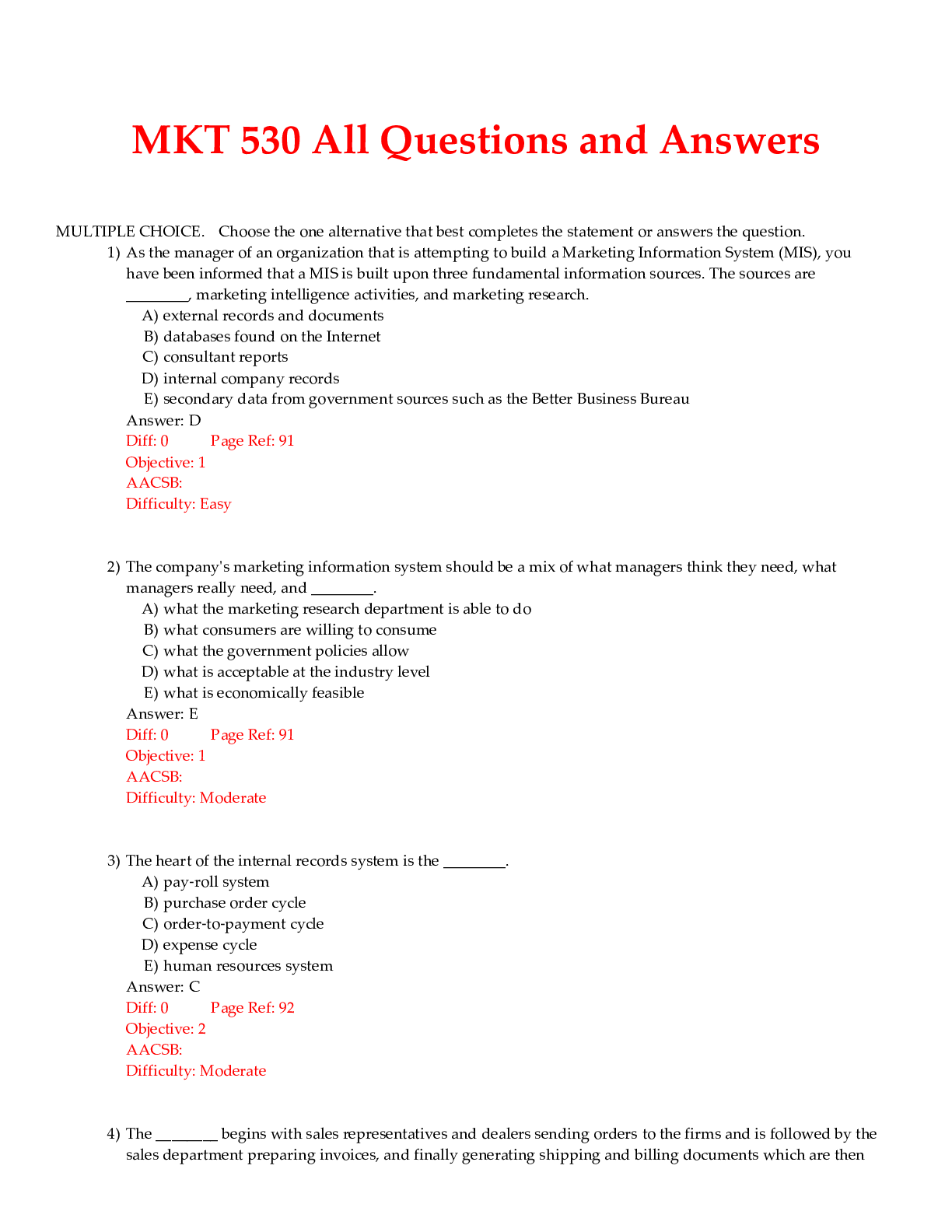
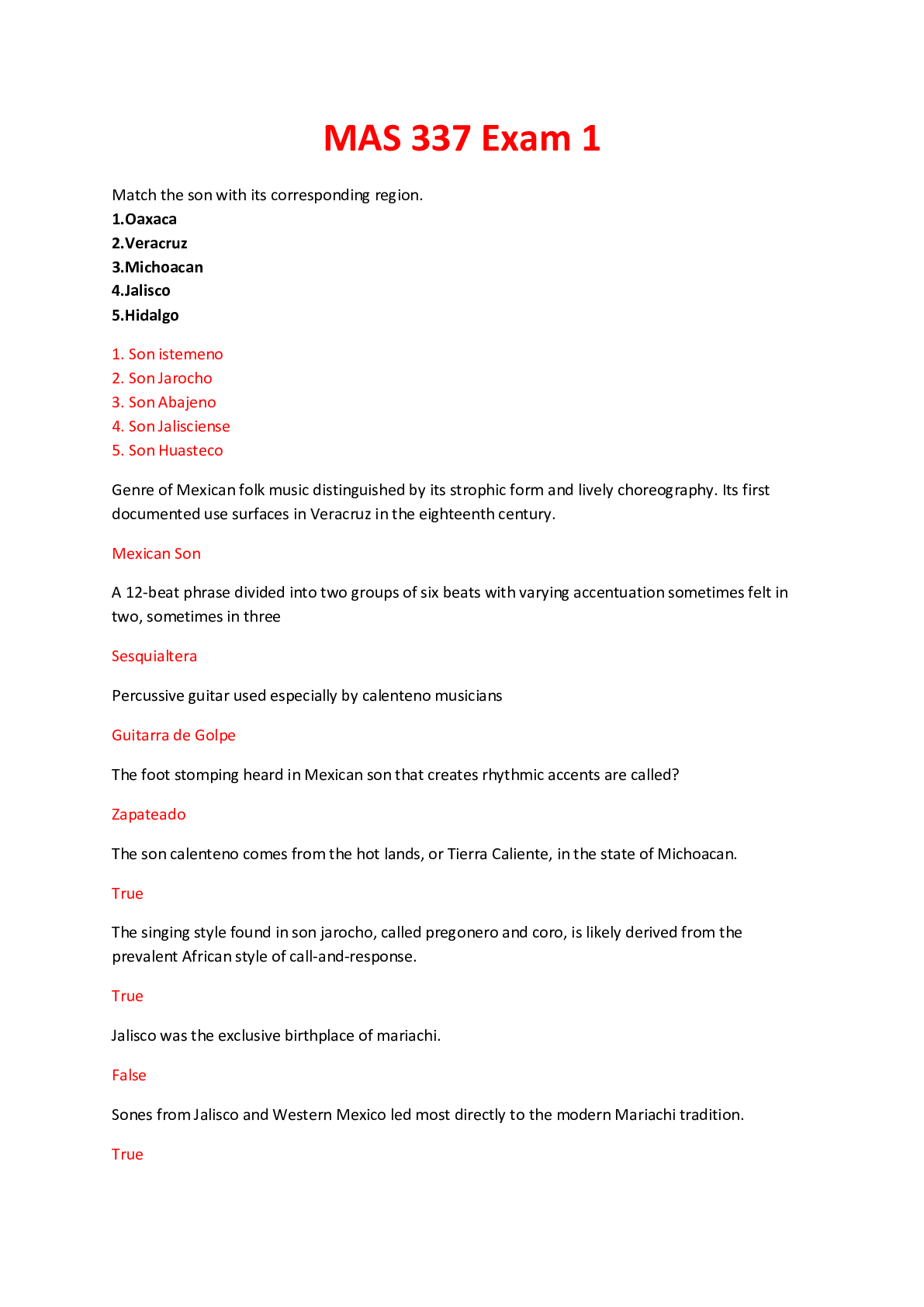
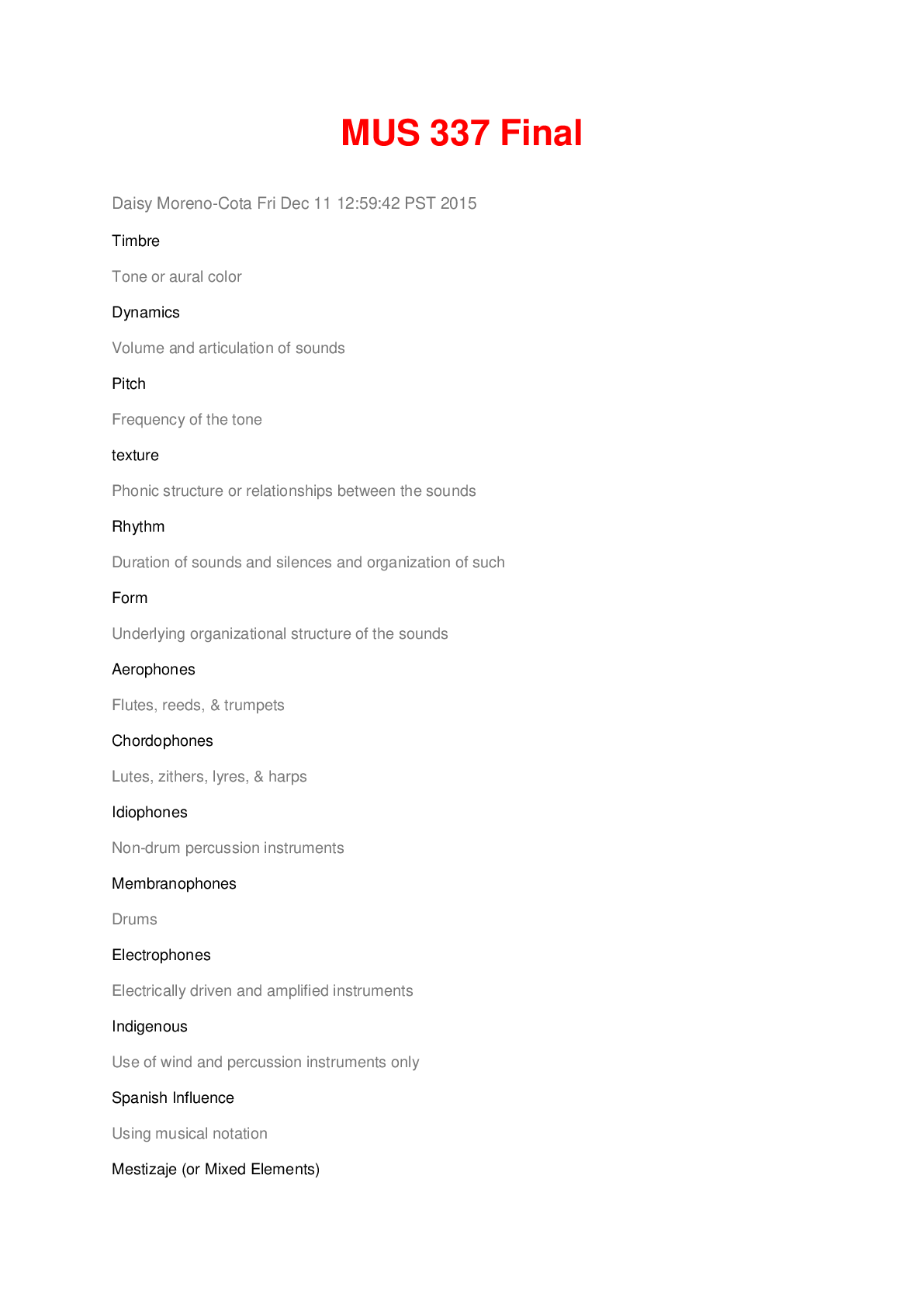
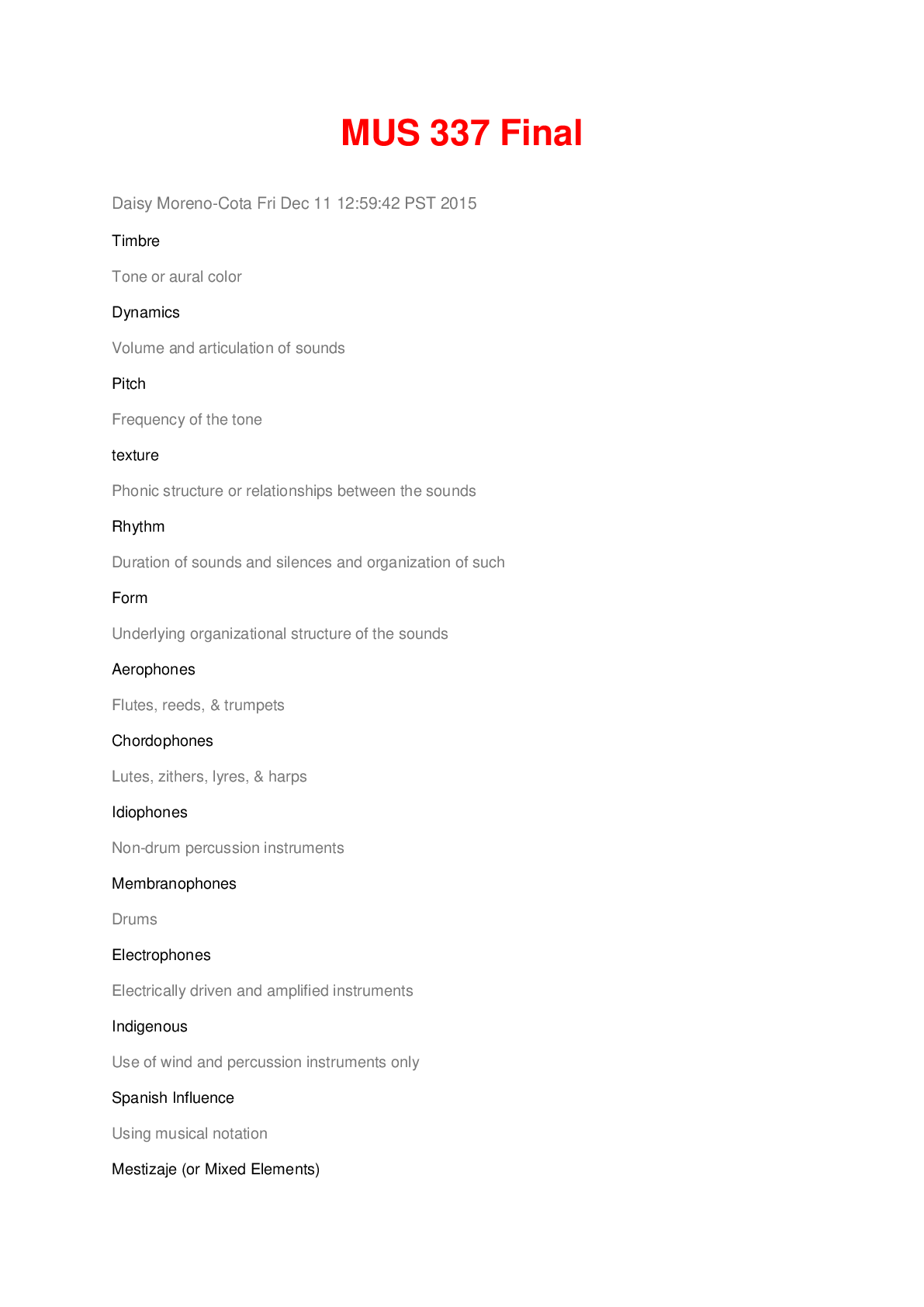
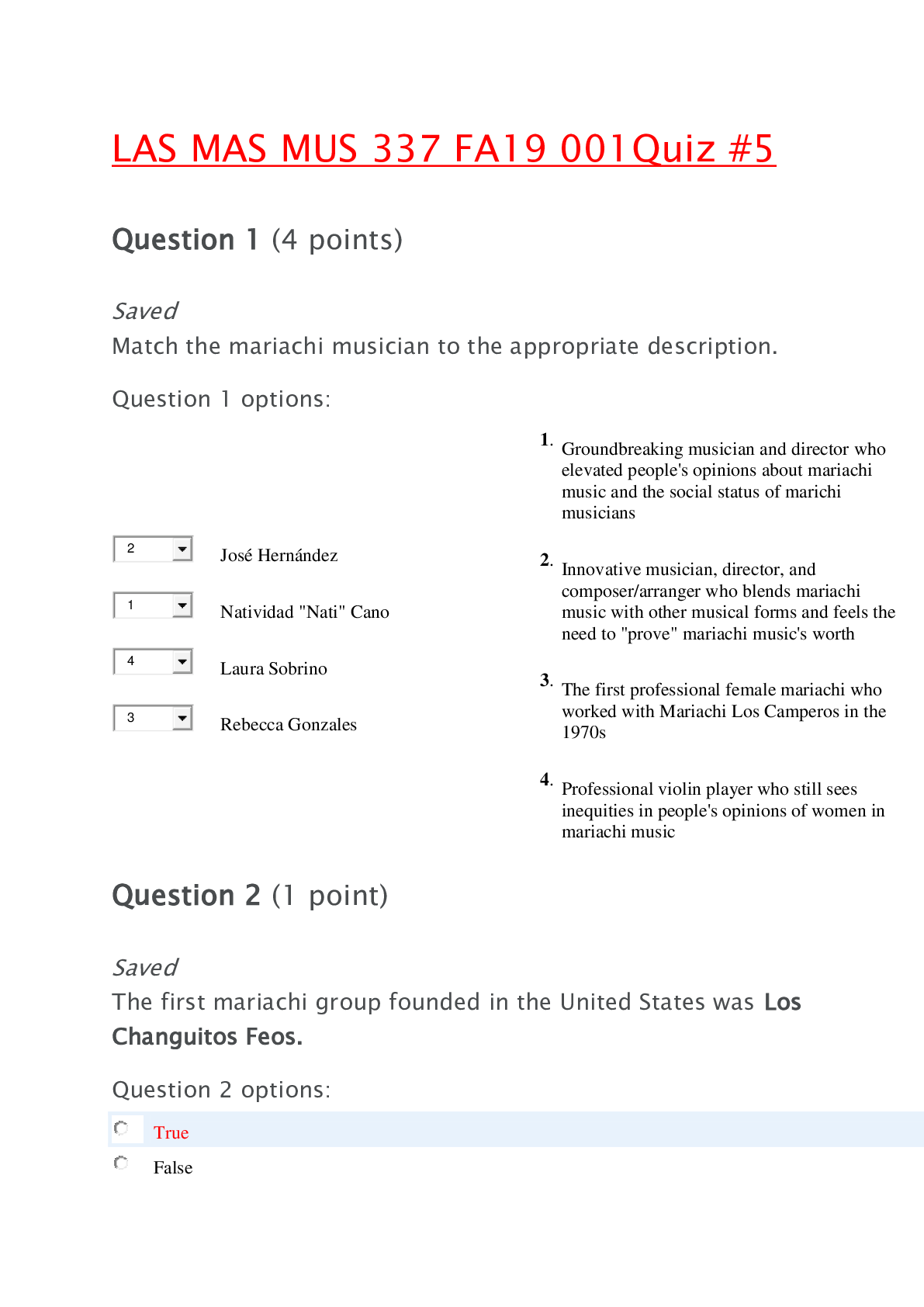
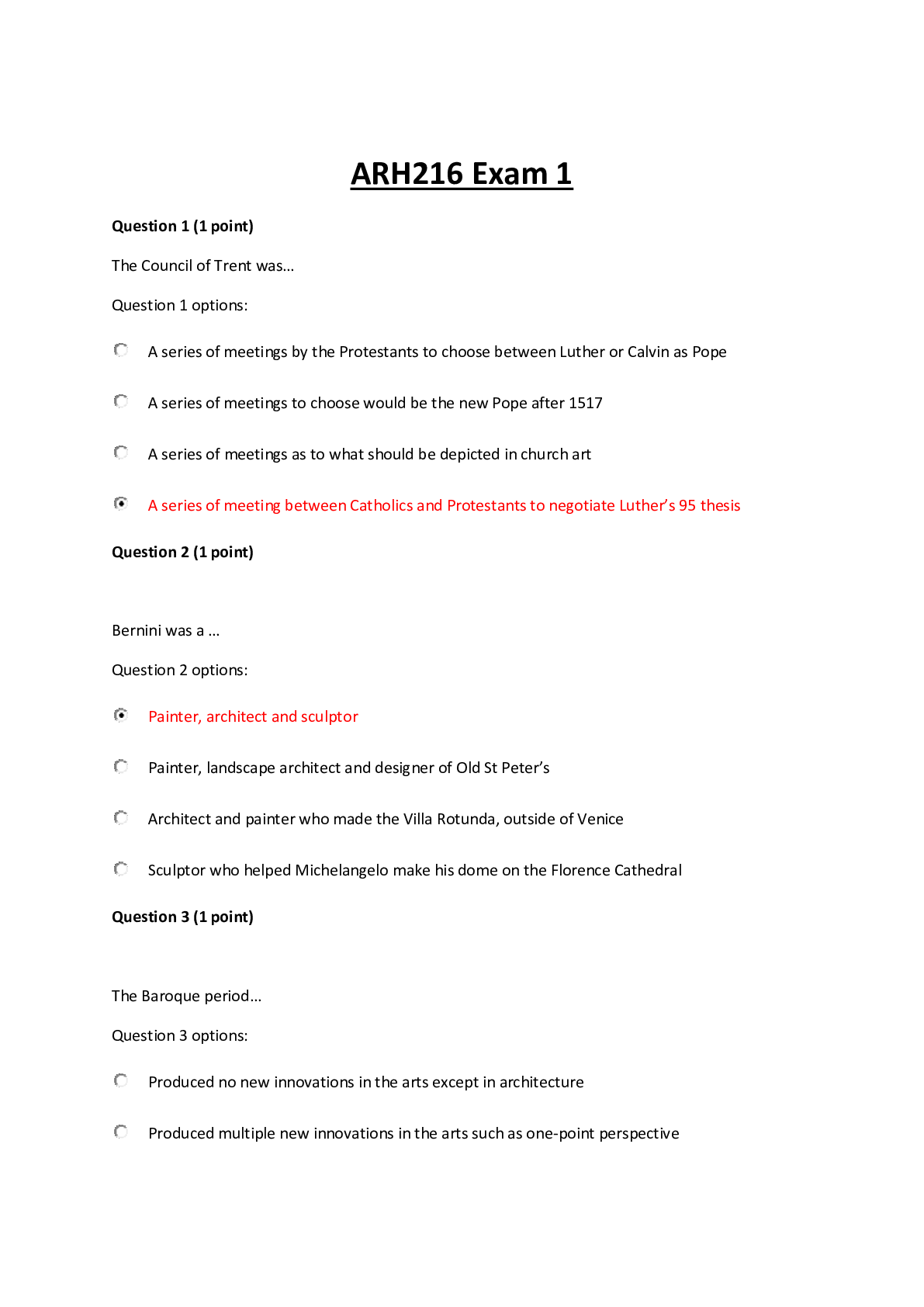
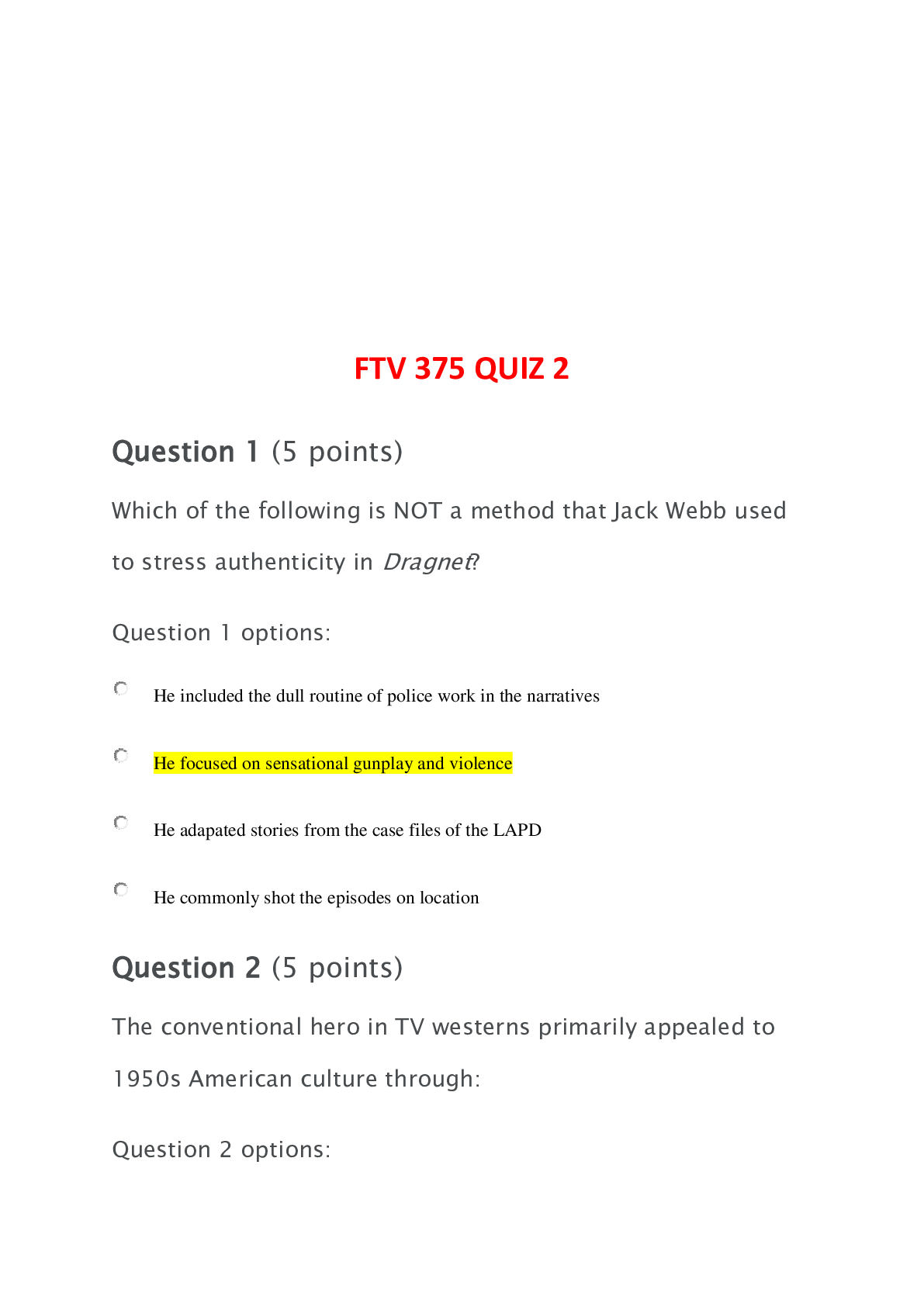
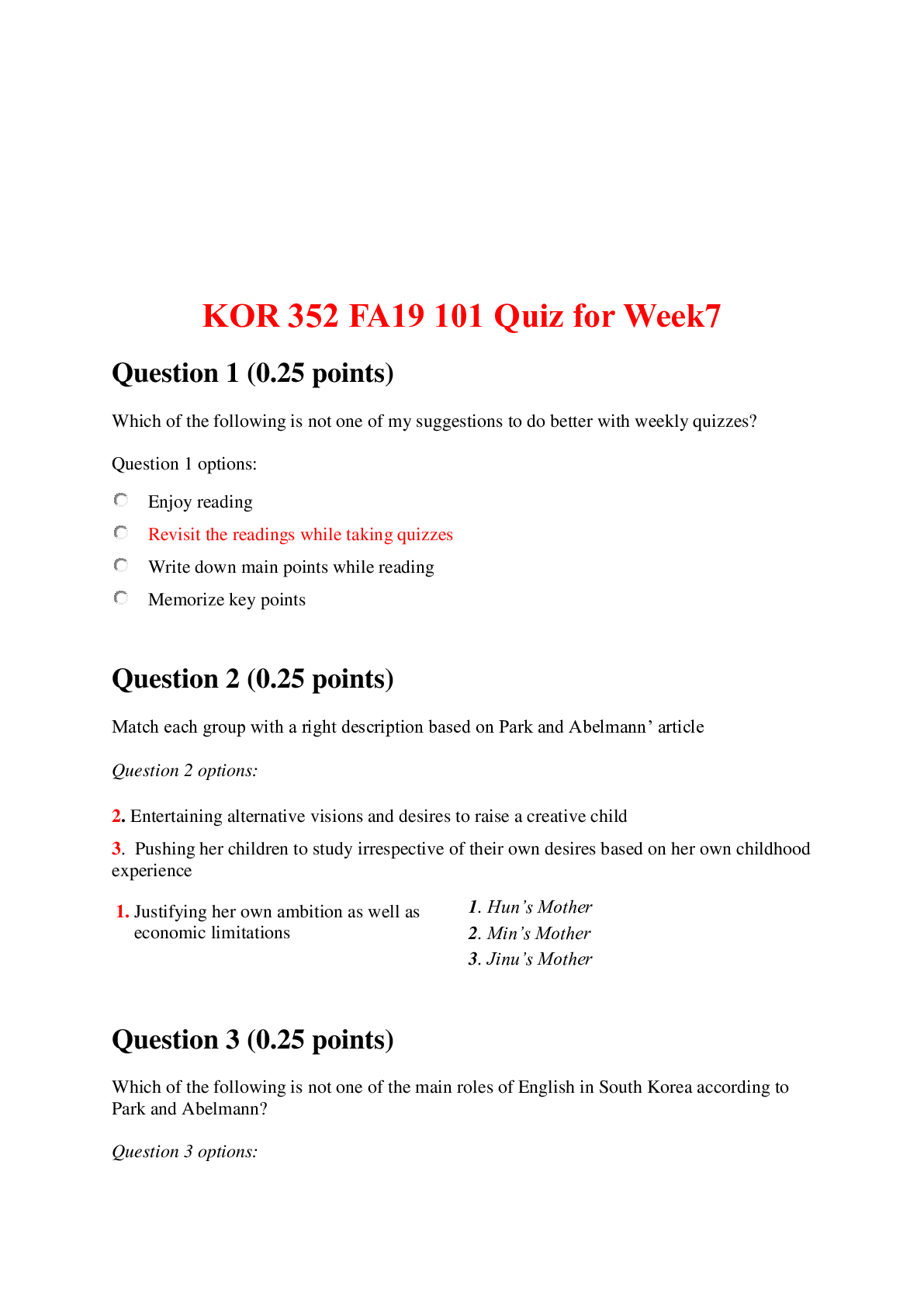

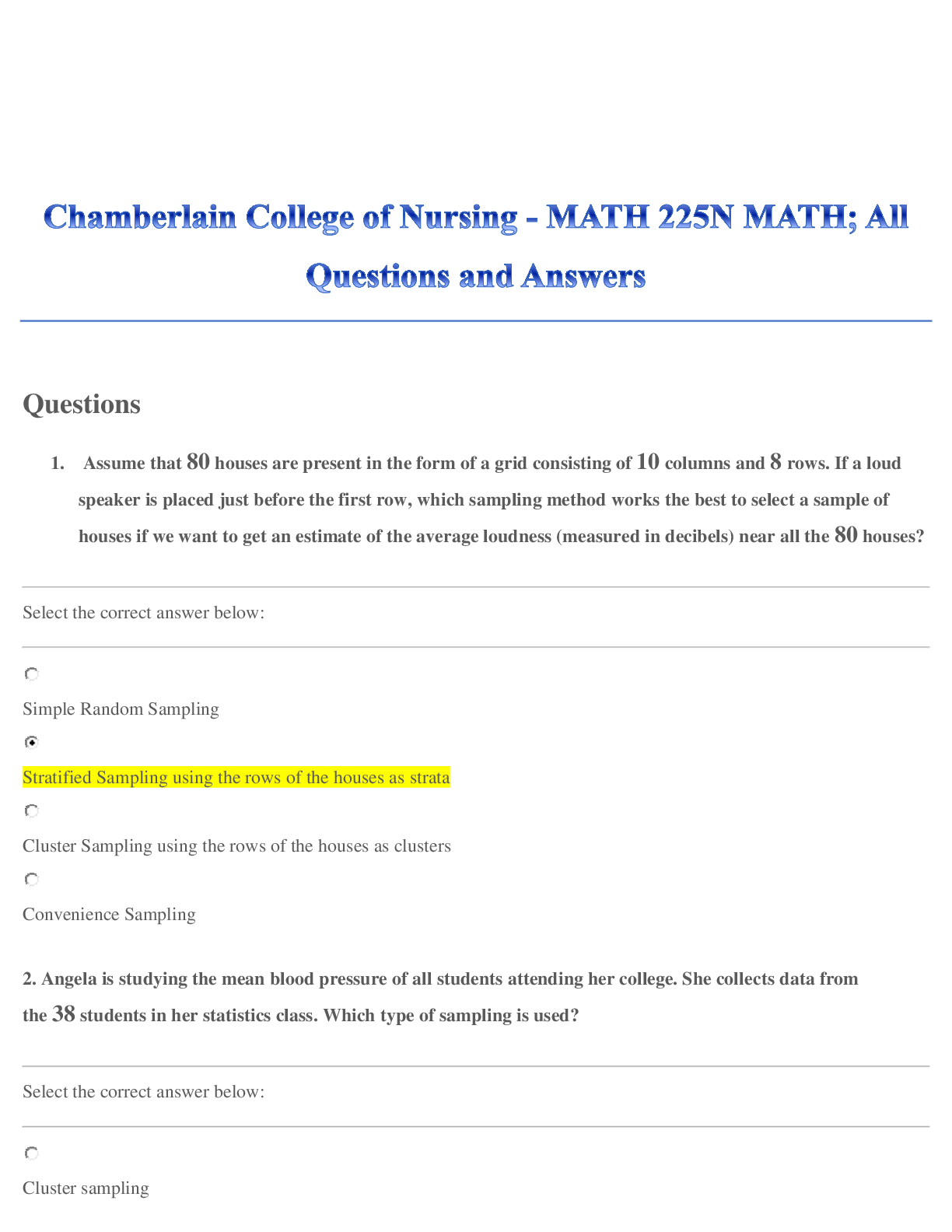
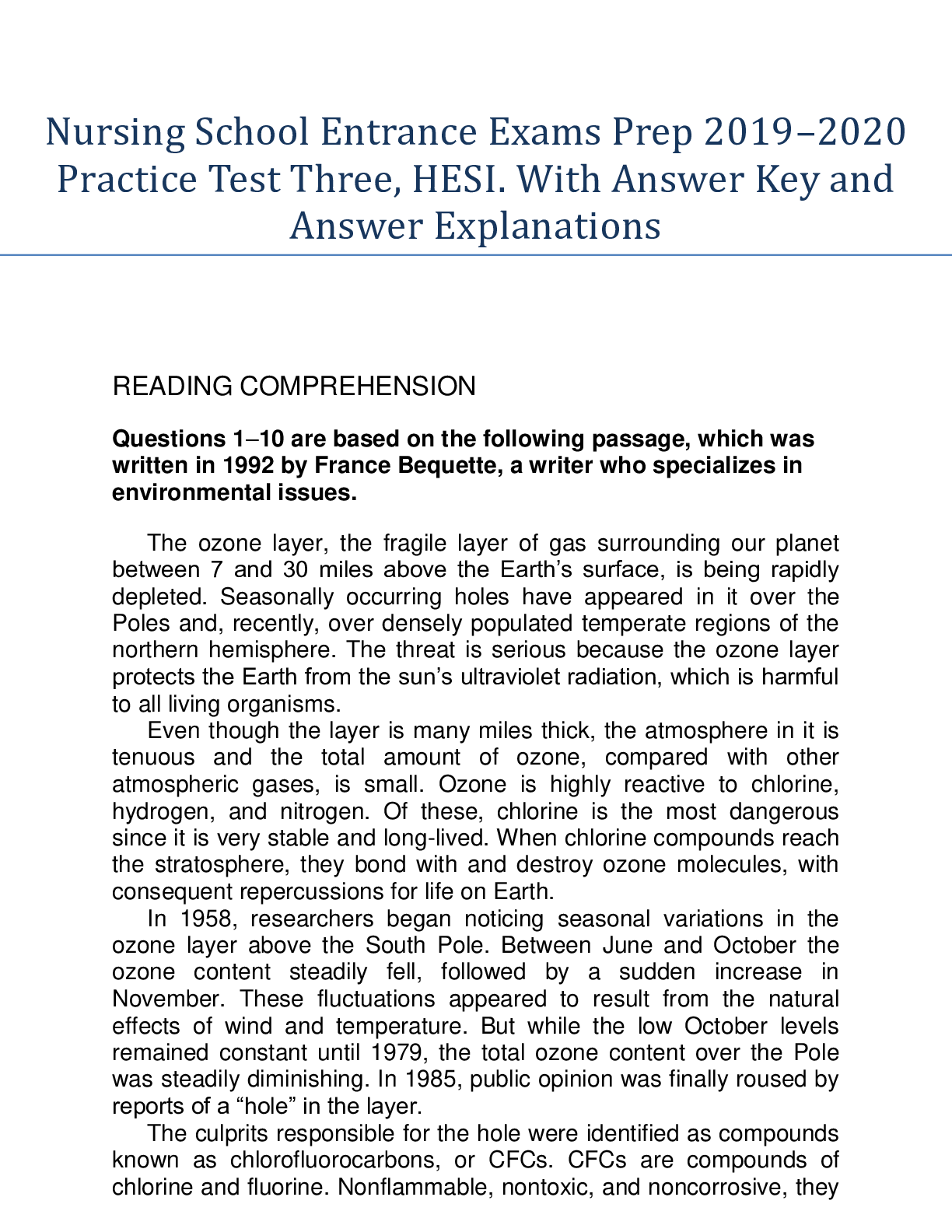
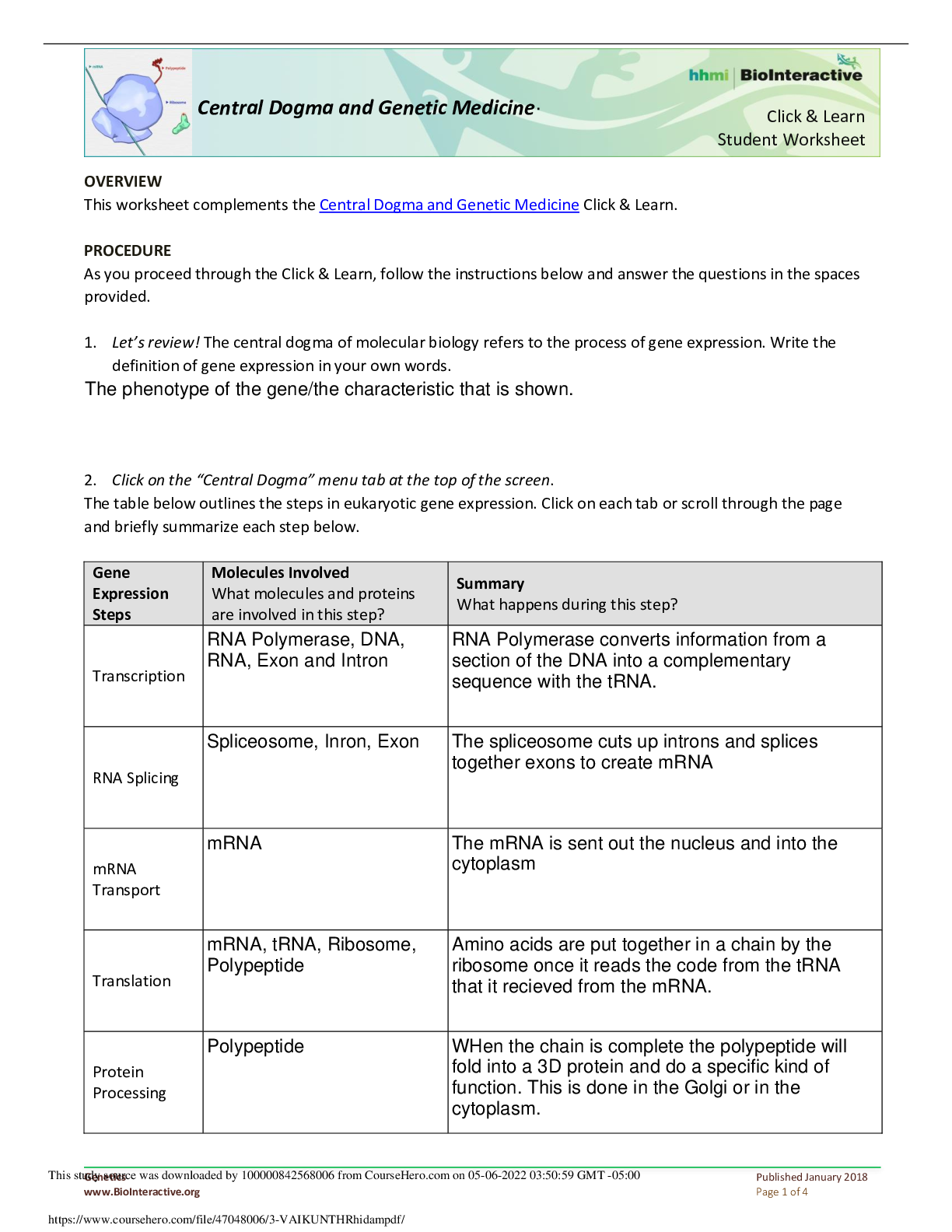
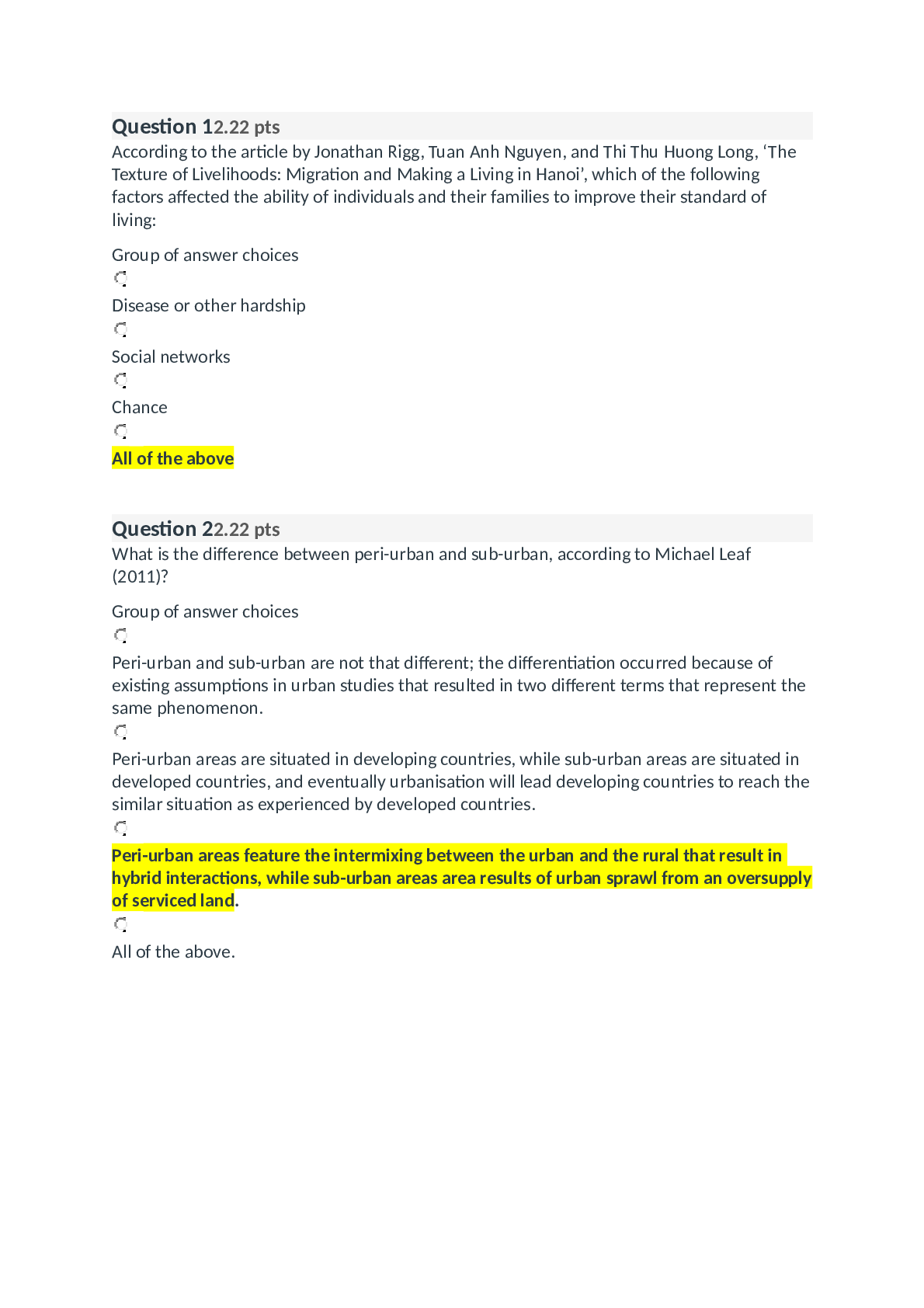

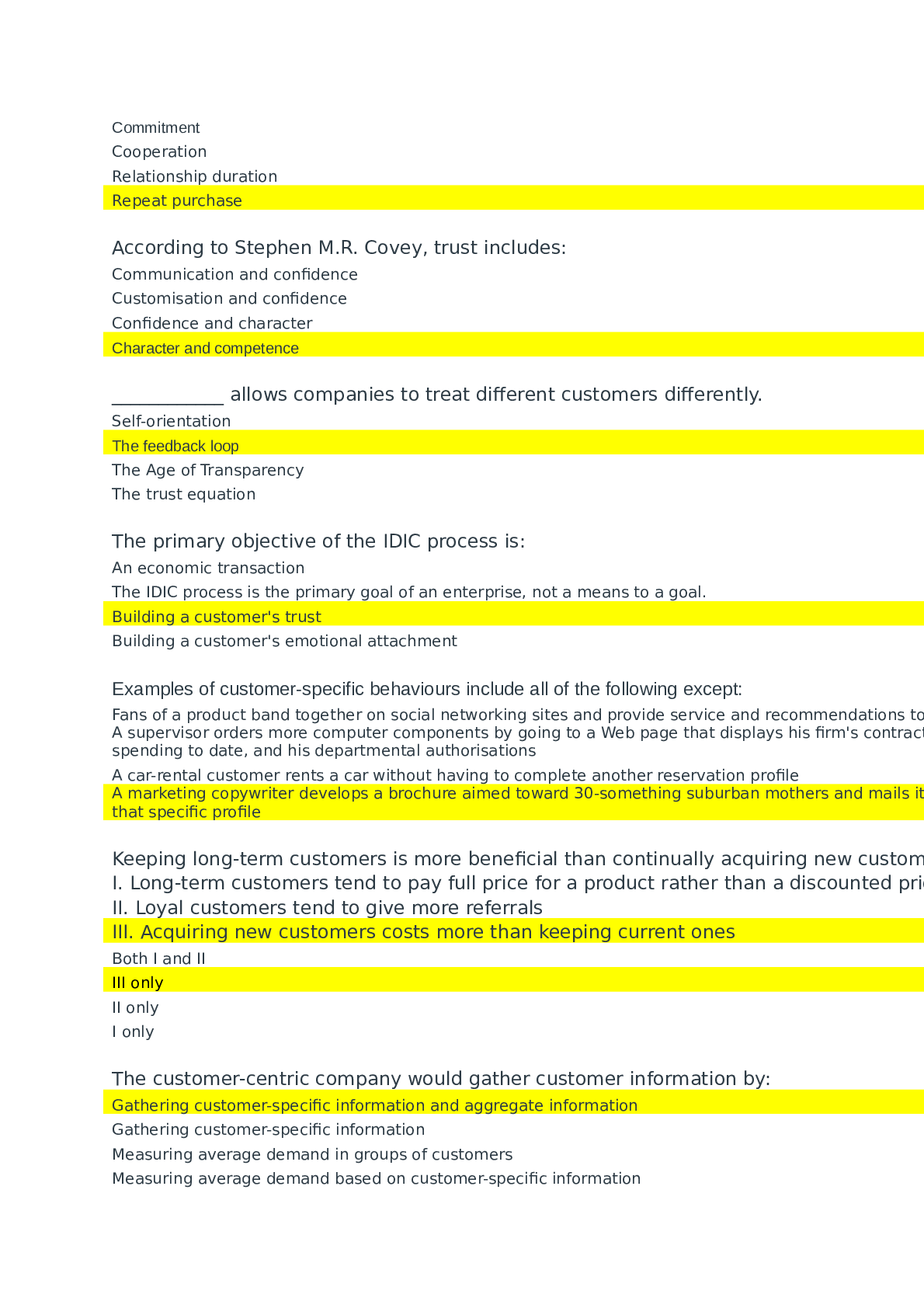
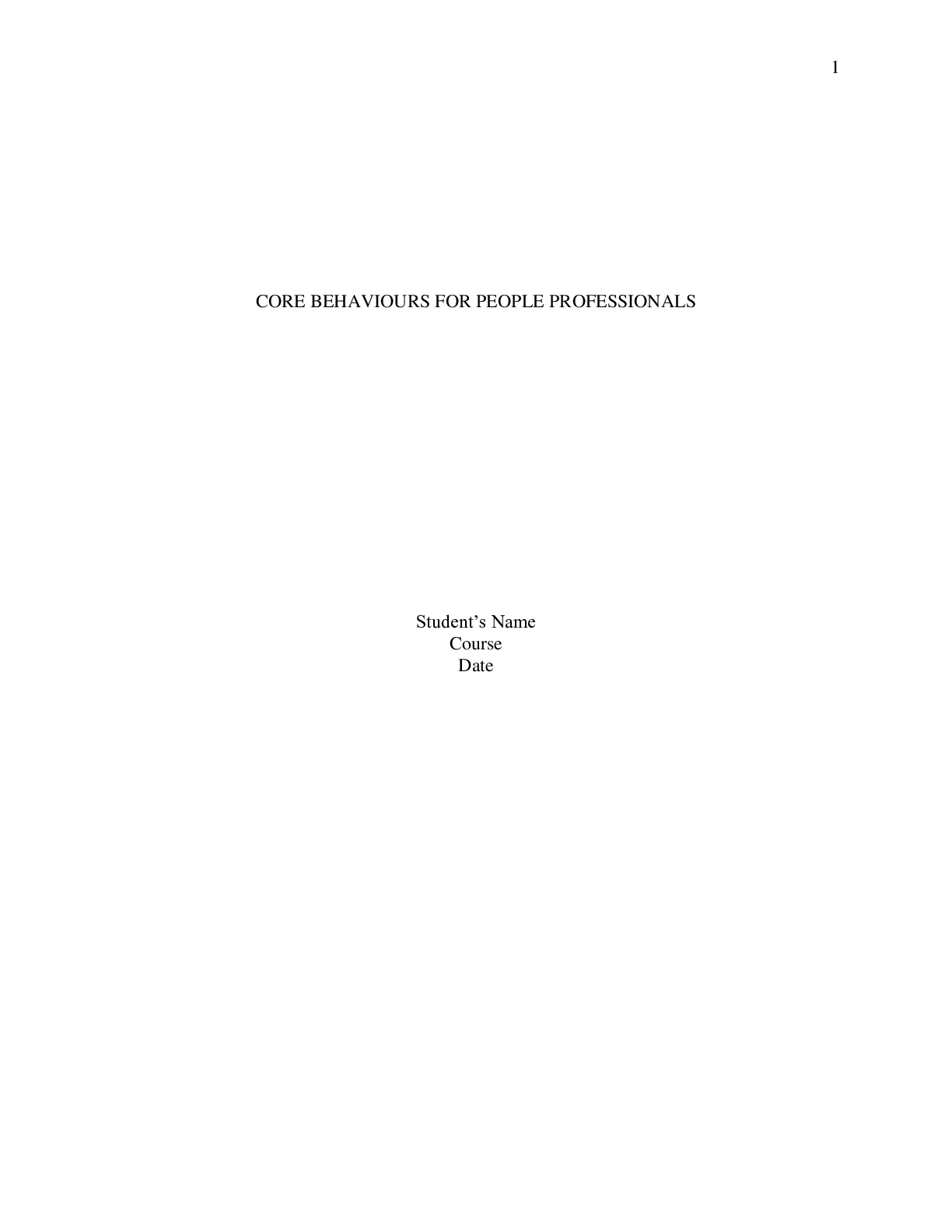
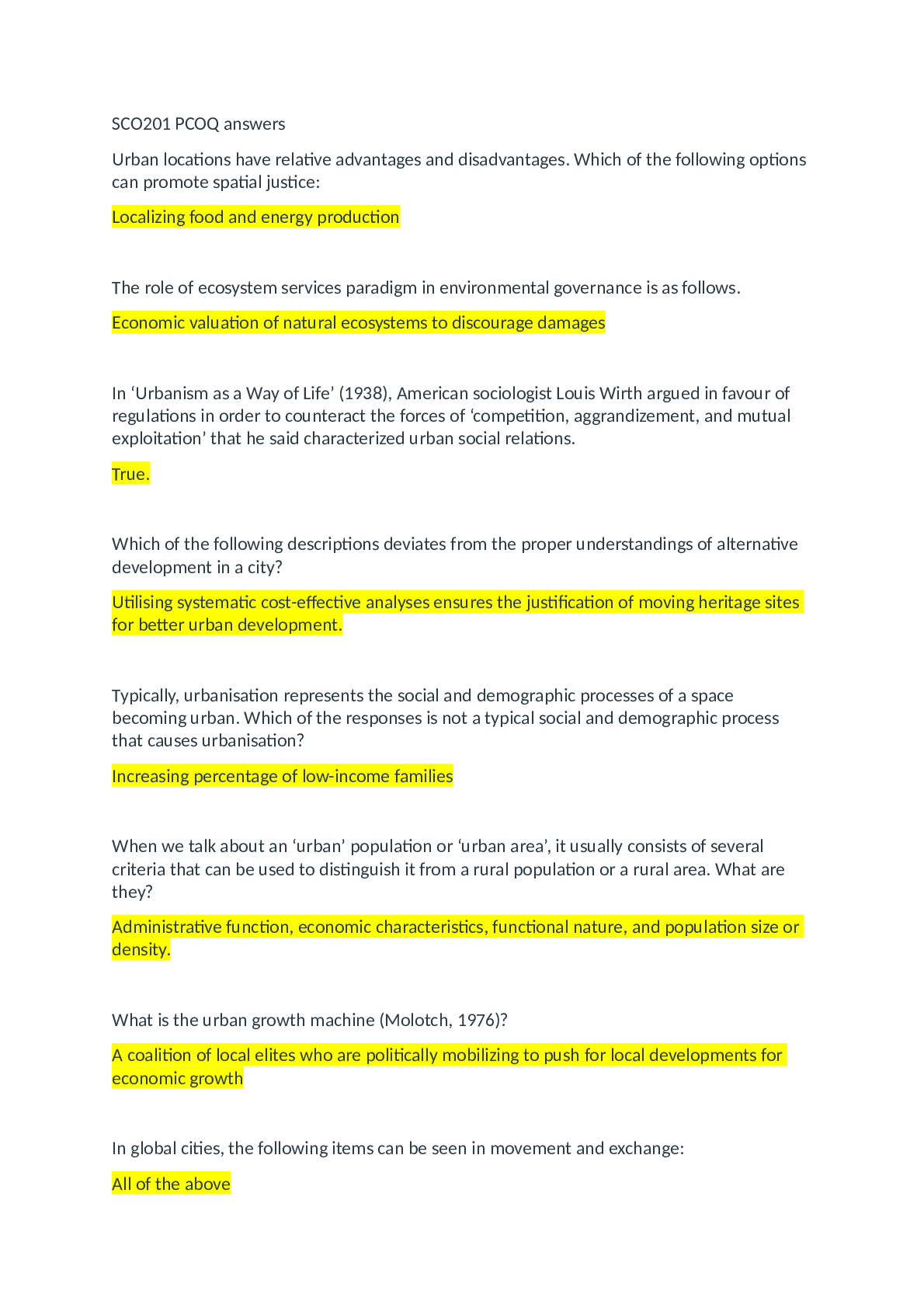
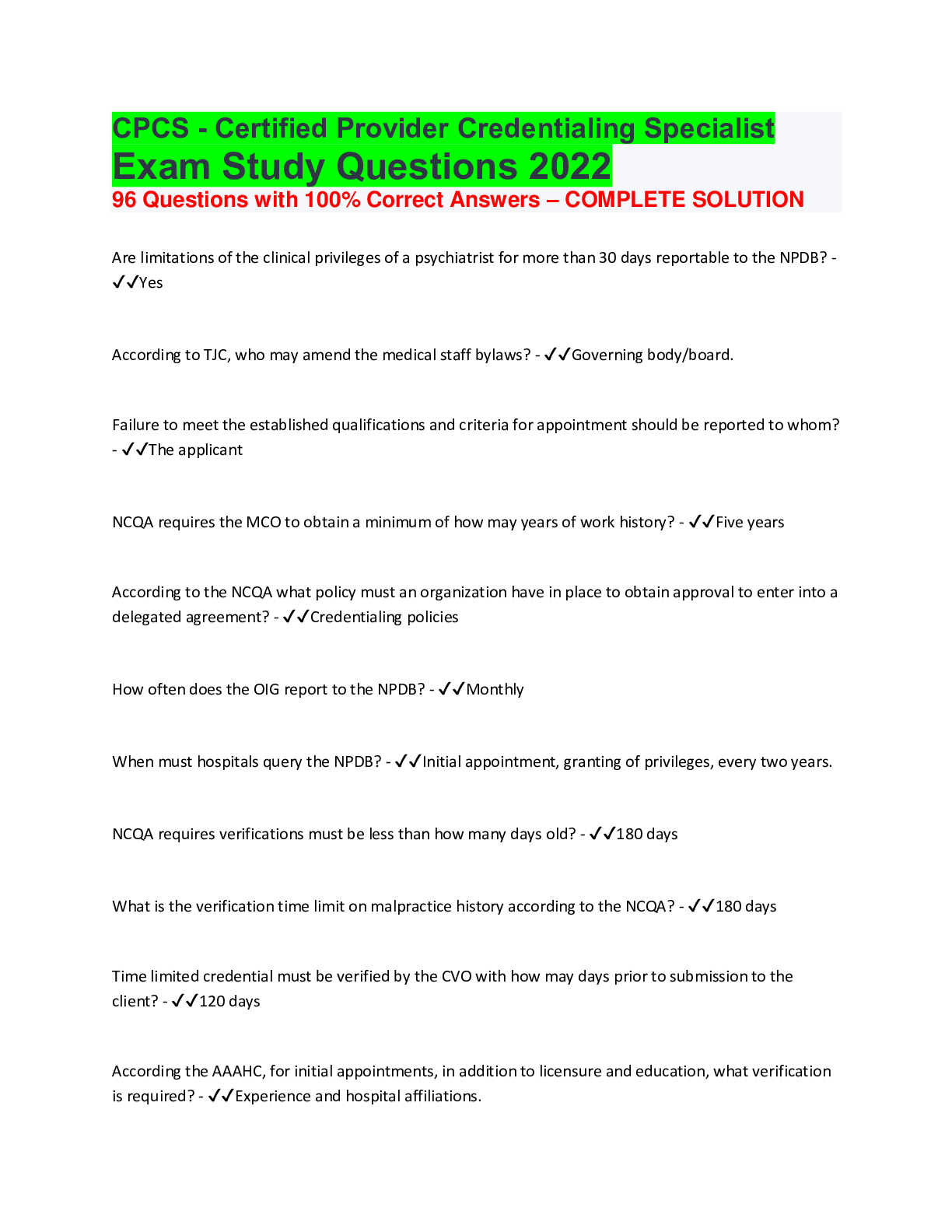
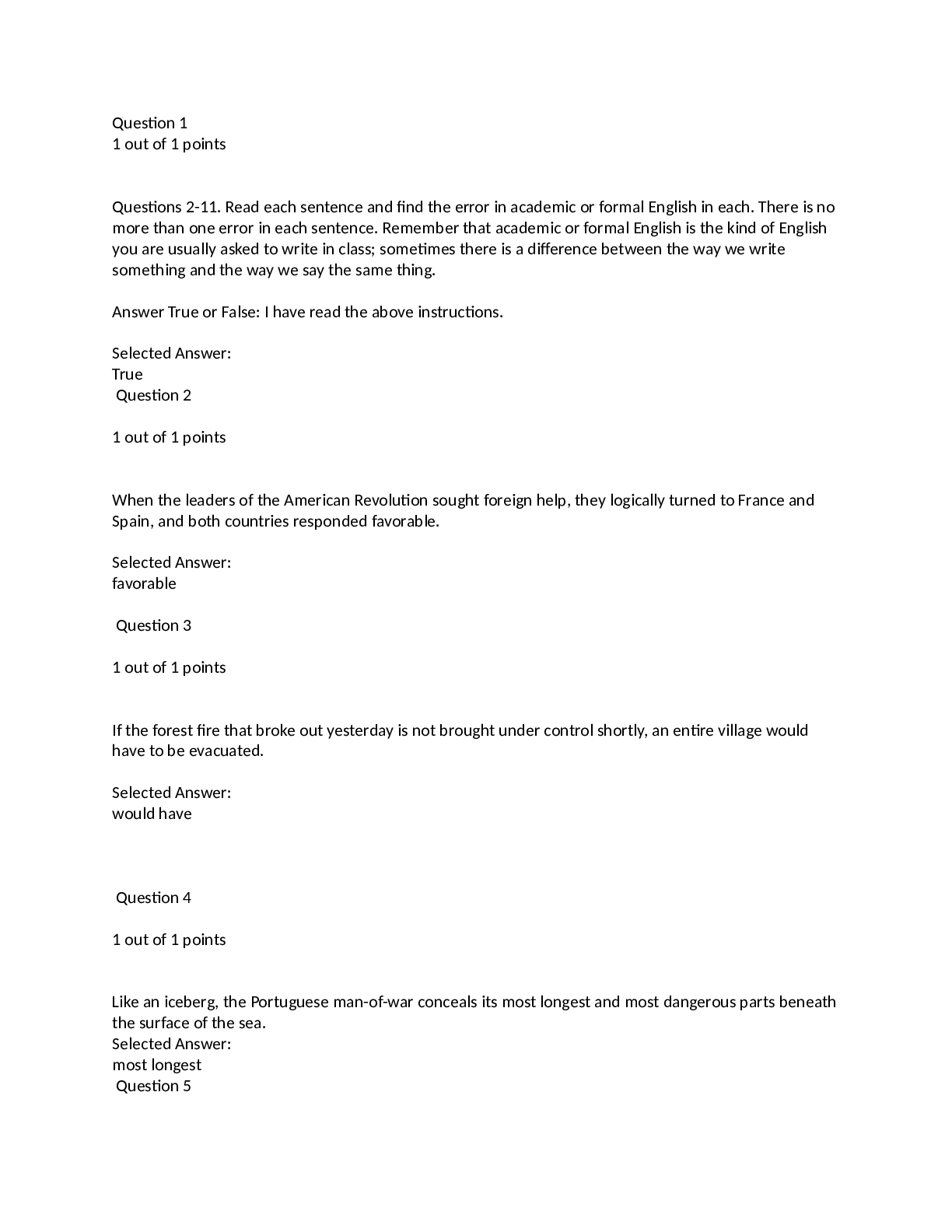
.png)
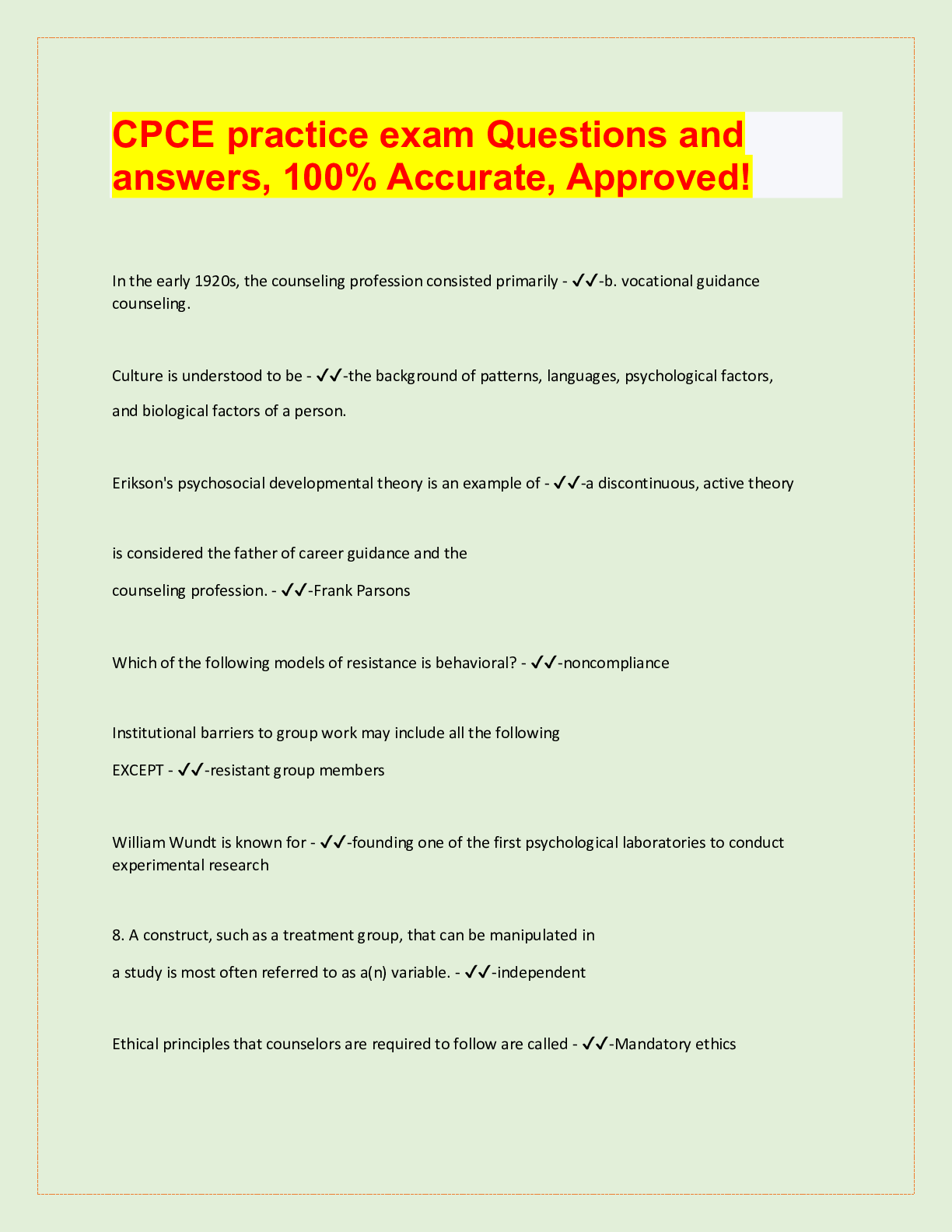

.png)
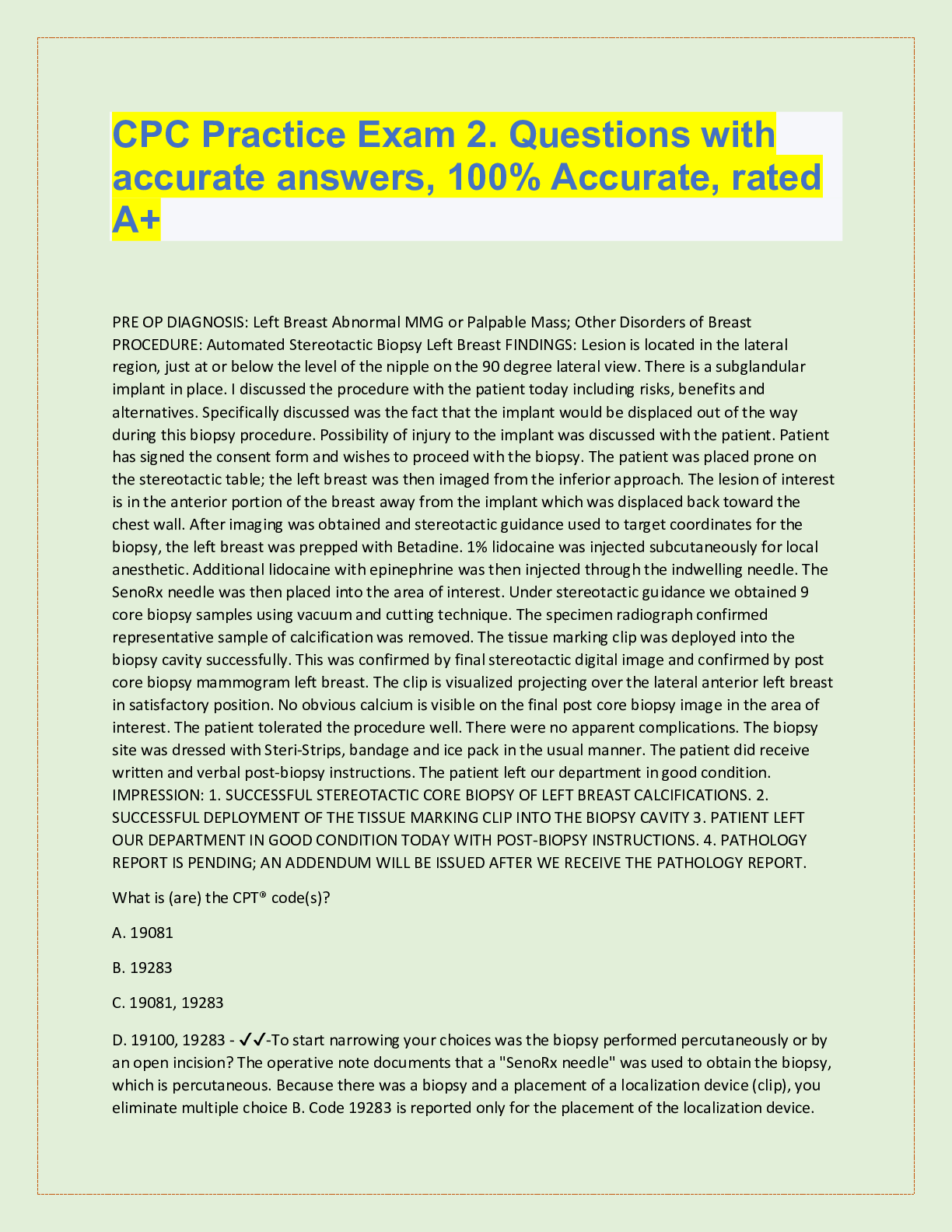

.png)



